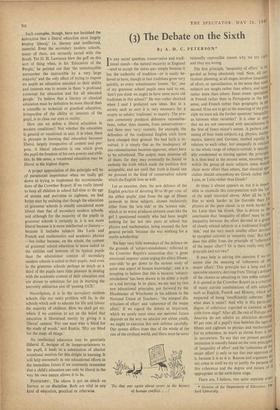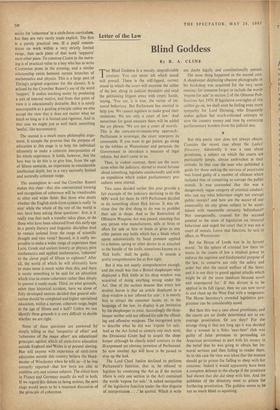(3) The Debate on the Sixth
By A. D. C. PETERSON* N any social question, conservative and tradi- tional minds—the natural majority in England —tend to accept the status quo simply because it has the authority of tradition—or is easily be- lieved to have, though in fact traditions grow very quickly, as every schoolmaster knows. 'Sir,' one of my grammar school pupils once said to me, 'don't you think we ought to have some more old traditions in this school?' He was rather shocked when I said I preferred new ideas. But in a society such as ours it is very necessary for a sceptic to subject 'traditions' to inquiry. The pro- cess commonly produces defensive rationalisa- tions, rather than reasons, from conservatives— and these may vary; recently, for example, the defenders of the traditional English sixth form have changed their ground. No bad faith is in- volved; it is simply that as the inadequacy of one rationalisation becomes apparent, others have to be substituted. The sceptic must examine all of them; for they may eventually be found to embody the truth which made the tradition first acceptable, and not until that truth is found can we proceed to the kind of conservative reform which the English love so well.
Let us examine, then, the new defence of the English practice of devoting 80 to 90 per cent. of the ablest pupils' time from the age of fifteen onwards to three subjects, chosen exclusively either from the 'arts side' or the 'science side,' which at its worst produces extreme cases like the girl I questioned recently who had been taught nothing for her last two years at school but physics and mathematics, being excused the few general periods 'because she was working for a maths scholarship.'
We hear very little nowadays of the defence on the grounds of 'subject-mindedness,' reflected in the Crowther Report's contention that 'a great emotional impetus' exists urging the ablest fifteen- year-olds 'to get down to the serious study of some one aspect of human knowledge'; and it is tempting to believe that this is because 'subject- mindedness' has been shown to be either a myth or a red herring. In its place, we are met by two new educational principles, put forward by the Headmaster of Winchester in his address to the National Union of Teachers: 'the unequal dis- tribution of effort' and 'coherence of the major effort.' If we regard the debate as important, which we surely must since our national future depends on the way we educate our ablest youth, we ought to examine this new defence carefully. Our system differs from that of the whole of the rest of the civilised world, and there must be some
'Do that one again about never in the history of human conflict. . .
rationally expressible reasod why we are and they are wrong.
The first principle, 'inequality of effort,' is re- garded as being absolutely vital. Now, all cur- riculum planning, at all stages, involves inequalitY of effort, or specialisation, in the sense that some subjects are taught rather than others, and some rather more than others. Jones minor specialises in French rather than in Portuguese in the first sense, and French rather than geography in the second. If we are to get at the meaning of the rip' ciple we must ask the further question: 'inequalitY as between what variables?' It is clear at once that we are not concerned with specialisation Ip the first of Jones minor's senses. A pattern con' sisting of four main subjects, e.g. physics, mathe' matics, history and German, studied equally io relation to each other, but unequally in relation to the whole range of subjects outside, is specific' ally condemned as sinning against the principle. Is it then used in the second sense, meaning that within the group of main subjects some should claim more effort than others, that classical sPe' cialists should concentrate on Greek rather than Latin, or Latin rather than Greek?
At times it almost appears so, but it is impost sible to reconcile this interpretation with the 'sin of the pupil recorded above. After all he is as free to work harder at his German than his physics as the pure classic is to work harder at his Latin than his Greek. One is driven to the ' conclusion that 'inequality of effort' must be the inequality between the effort devoted to a grouP of closely related subjects in a traditional English, 'side,' and the very much smaller effort devoted to marginal interests in 'minority time.' But hov does this differ from the principle of 'coherence of the major effort'? Or is there really only one principle and not two?
It may help in solving this question if we e74" amine algo the meaning of 'coherence of the major effort.' This principle has a long and re- spectable ancestry, deriving from Thring's defence, of the classics as educating in 'one noble subject. It is quoted in the Crowther Report as a criticism of many current combinations of arts subjects, such as English, French and History, which are suspected of being 'insufficiently coherent.' But what does it mean? And why is this particular degree of coherence regarded as essential at the, sixth-form stage? After all, the rest of Europe and America do not admire an education devoting , 85 per cent. of a pupil's time between the ages of fifteen and eighteen to physics and mathematics for its coherence, so much as shrink from it for its narrowness. To say that our present peculiar institution is soundly based on the twin principles of 'inequality of effort' and the 'coherence of the major effort' is only to say that one approves of it, because it is as it is. Reason and argument do not come in until we try to justify the purpose of this coherence and the degree and nature of it appropriate to the sixth-form stage.
There are, I believe, two quite separate argo'
• Director of the Department of Education. OS' ford University. 'ti
ments for 'coherence' in a sixth-form curriculum, but they are very rarely made explicit. The first is a purely practical one. If a pupil concen- trates on work within a very strictly limited range, then each piece of that work 'supports' each other piece. To construe Cicero in the morn- ing is of practical value to a boy who has to write Ciceronian prose in the evening; and a similar relationship exists between certain branches of mathematics and physics. This is a large part of Thring's original argument for the classics. It is echoed by the Crowther Report's use of the word 'support.' It makes teaching easier by producing a sort of internal motive, and from that point of view it is educationally desirable. But it is surely unacceptable as a guiding principle unless we also accept the view that it does not matter what we teach so long as it is limited and rigorous. And in that case we might just as well teach something 'useful,' like accountancy.
The second is a much more philosophic argu- ment. It accepts the premise that the purpose of education at this stage is to help the individual ultimately to make a coherent interpretation of his whole experience. It holds, however, that the best way to do this is to give him, from the age of fifteen onwards, an experience in considerable intellectual depth, but in a very narrowly limited and naturally coherent range.
The assumption is—and the Crowther Report makes this clear—that this concentrated training and recognition of coherence will be transferable to other and wider fields. But those who doubt whether the English sixth-form system is really 'in step' while the whole of the rest of the world is out, have been asking three questions: first, is it really true that such a transfer takes place, or do those who have been educated from this early age in a purely literary and linguistic discipline tend to remain isolated from the range of scientific thought and vice versa? Second, is it really im- possible to make a wider range of experience than Latin, Greek and ancient history, or physics, pure mathematics and applied mathematics, 'coherent' to the clever pupil of fifteen to eighteen? After all, the world of which he will ultimately have to make sense is much wider than this, and there is surely something to be said for an education which tries to create coherence rather than simply to present it ready-made. Third, on what grounds, other than historical accident, have we alone of fully developed nations decided that general edu- cation should be completed and higher specialised education, within a narrow, coherent range, begin at the age of fifteen and a half? Unless we can identify these grounds it is very difficult to decide whether we arc right.
None of these questions are answered by simply telling us that 'inequality of effort' and 'coherence of the major effort' are educational principles against which all sixth-form education outside England and Wales is at present sinning. Nor will anyone with experience of sixth-form education outside this country believe the Head- master of Winchester when he tells us—if he was correctly reported--that few boys are able to combine arts and science subjects. The ablest boys in France and Germany usually do well in both. If we regard this debate as being serious, the next stage would seem to be a reasoned discussion of the principle of coherence.















































 Previous page
Previous page